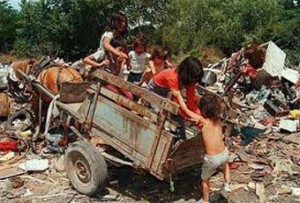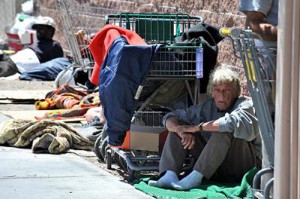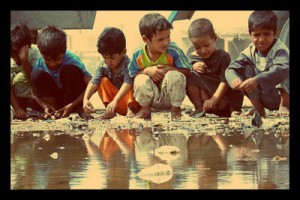Posts made in February, 2014
Post Traumatic Ghetto Stress

 Ghetto is defined in the Merriam Webster dictionary as “a part of a city in which members of a particular group or race live usually in poor conditions.” On Dictionary.com, the term “ghetto” is defined as “a section of a city, especially a thickly populated slum area, inhabited predominantly by members of an ethnic or other minority group, often as a result of social or economic restrictions, pressures, or hardships.” As you might have noticed, the key feature that stands out from both definitions is the prevalence of an impoverished environment.
Ghetto is defined in the Merriam Webster dictionary as “a part of a city in which members of a particular group or race live usually in poor conditions.” On Dictionary.com, the term “ghetto” is defined as “a section of a city, especially a thickly populated slum area, inhabited predominantly by members of an ethnic or other minority group, often as a result of social or economic restrictions, pressures, or hardships.” As you might have noticed, the key feature that stands out from both definitions is the prevalence of an impoverished environment.
People who live in an impoverished environment are exposed to all kinds of dangers from the moment they are born until they grow up. Crime is a normal occurrence they hear about. Theft is most likely something they witness almost all of their lives. Now, these kinds of scenarios that occur almost every day can have adverse effects on the brain. In other words, it leads to people developing post-traumatic stress disorder (PTSD).
Yes, although PTSD is most likely associated with war veterans, having been to war is not the only trigger needed to develop PTSD. While it is a fact that traumas such as accidents, rape, or a violent crime are major contributors to people developing PTSD, those who have suffered chronic traumas such as being subjected to child abuse, living in an area with a high crime rate, or living in an area with extreme poverty are also prone to PTSD.
In short, people living in adverse environments have a high chance of developing PTSD. Each and every day, their lives are filled with uncertainty. What happens when they walk out of their door? What will happen once they get home? Will they meet some sort of unfortunate event on their way to school or work? Questions about safety and security usually linger in the minds of those living in poverty.
Apart from that, there’s also the question of financial and job stability. People living in a disadvantaged situation are always going to wonder whether they will have enough money to get by the next day, whether they will have sufficient money to pay for bills, and other finance-related matters.
On the employment front, they are faced with not being able to secure high-paying jobs. That is not even the worst part. The worst part is that their employment status will always remain a question. Who knows how long they can hold on to their current job? What if the store they are employed in is shut down for some reason? This will leave them jobless, and all the more important, add more stress to their current difficult situation.
One of the worst things about living in absolute poverty is that some people actually turn to violence as a result of all their experiences and frustrations. Not only that, there’s also a huge chance that they will turn to drugs as an escape. This is absolutely the thing you don’t want for any of your family members. This is why it is very important to understand the first signs of PTSD in your friends and family. This way, you’ll be able to get all the help they need so their lives can make a turn for the better, and not the worst.
The question is: what if they are already diagnosed with PTSD? The answer is that help is still very much possible. Recovery from something as serious as PTSD can be achieved as long as proper help is given. Although their brains are already wired to the negative, this can be re-wired to think about more positive things.

Justifying the Daily Struggle of Poverty

 Most people think of poverty as this distant concept that’s only worth discussing in Time magazines or political debates. But here’s the harsh truth; poverty is not just a word in the dictionary that you occasionally use, it’s a situation that we all struggle with every single day.
Most people think of poverty as this distant concept that’s only worth discussing in Time magazines or political debates. But here’s the harsh truth; poverty is not just a word in the dictionary that you occasionally use, it’s a situation that we all struggle with every single day.
Let’s start with the most basic, nutrition.
A common issue that arises with poverty is malnutrition. Of course, it only makes sense. If a person does not have enough means to support himself and his family, it also goes to say that he cannot provide good food on the table to make sure that his brood stays healthy.
This is the most basic struggle of a person with low means because malnutrition then leads to other problems. For example, when you’re not healthy, you often get sick, which means you’d have to go to the hospital often. Hospital visits mean hospital bills. Hospital visits means doctor’s fees and prescription drugs. Worse yet, sick days ultimately lead to loss of salary. The significant factor here is for minimum wage workers whose every daily salary counts. A single day’s worth of loss could mean a LOT for his/her family.
Another consideration besides nutrition is emotional and psychological health. It’s not uncommon for rich and spoiled heiresses to suffer from depression and substance addiction. But a huge percentage of people who are depressed or suicidal come from the poverty line.
It can’t be expressed by words but the emotional pain and grip that comes from having less or no money is only something you can relate to if you’ve been there. It’s not just about feeling helpless, but feeling hungry, tired, and emotionally drained at the same time.
But perhaps the biggest struggle of belonging in the poverty line is that, through all your hard work, through every sweat and blood you’ve put through just to make it through the day, you still won’t get out of that poverty line.
How so?
The most pressing concern for people in poverty is that there’s around 40% chance that they’ll stay poor or get poorer. That’s not a very good motivator, yes? Why work when there’s a big chance that you’ll only have enough to make it through the day? But then, you DO have to work to feed yourself and your family, pay for your home, pay for school and a good life, etc. So where do you strike the line?
As heavy as that burden feels, it’s an even bigger struggle when you’re drowning in debt. Poverty makes your financial activities so difficult that you’re forced to apply for loan after loan. Soon, you’ll be drowning in a vicious loan cycle, struggling to keep track of your income that’s being deducted for interest rates alone.
Debt cycle is the biggest daily struggle for people in poverty, as far as finances go. It encompasses every living expense, from auto loans, student loans, housing loans, down to personal and hospital loans. Every single loan a person takes out digs him deeper into a deep poverty grave. And mind you, this is not an easy situation to get out of.
The depressing reality of poverty is that it breeds more sociopolitical and environmental issues. It is not a single problem that’s isolated from other problems we face today. Poverty, that is modern poverty, has crippled many countries from development and hindered many businesses and industries from thriving.
Poverty isn’t just an embarrassing set of statistics you see on newspapers. It’s happening daily, it’s happening right now. The question is, what will you do about it?

The Desperate Mind of Poverty

What’s surprising is that most people perceive “poverty” as people wandering through the streets in greasy clothes, puffing on cigarettes, carrying signs, begging for pennies, and ignoring the faint hum of hunger on their bellies.
But the stark reality is, poverty doesn’t just exist on the busiest streets of our cities downtown. It’s scary that it’s such a prevalent situation in most countries. It doesn’t just incorporate “not having money”, but it includes “minimum wage”, “malnutrition”, “famine”, “depression”, “lack of social mobility”, and a cornucopia of other sociological problems that equate to what we now know as poverty.
It’s not just a singular concept, but multiple ideas. How so?
Minimum wage is a big problem in most developing countries (a kind euphemism for third world countries) because families are distraught and suffering from lack of sufficient income. Earning less than 20% of the amount you’d need to feed your wife and children in a day is not just an issue for a single family, but for millions.
The alarming part is that economies are going from bad to worse, at least some of them. In a gist, employers are having a hard time channeling their capital and reaping profits while employees are less stable in their careers. Minimum wage in jobs is just the cream of the crop.
Malnutrition is another concept that branches out from poverty. Basically, when you don’t have enough money to sustain and feed your family, family members go hungry and essentially become malnourished. You can’t purchase good, organic, nutritious food, that’s the main problem.
It’s part of the academic program in most primary education institutions that children be made aware of proper nutrition and exercise. But regardless of being aware of what’s healthy, it’s about putting healthy food on the table. Often, the parents/providers don’t have enough on their pockets to put that kind of food on the table. It’s simple mathematics: money = good food = nutrition
Famine is the more crucial issue when discussing poverty. It is such a sensitive topic, even discussed in guilty whispers and contrived communiqués. But while unequal distribution of resources is another issue, we can’t deny the fact that a single night of food leftovers in Las Vegas would be enough to feed South Africa for a year.
In fact, famine is as big an issue as poverty, the two both simultaneous and coexistent. One cannot exist without the other; poor people are essentially hungry and hungry people are essentially poor.
Lastly, depression and lack of social mobility go hand in hand in finalizing the seeming death blow of poverty. The phrase “money can’t buy happiness” is a tad bit of a ruse. After all, you can’t be happy when you’re starving, or sick, or helpless, or homeless. Your children won’t be happy when they’re laboring to put food on the table instead of enjoying their right to go to school. More to the point, poverty spells a lack of social potential. Unfortunately, communities run on classes, it is how our societies work. Different caste systems, but all have two common factors: the rich and the poor. It’s the lower class individuals that have less social mobility, meaning if you’re poor, there’s a 42% chance you’ll stay poor.
This desperate and almost hopeless state of poverty is not just a problem in a single country, but the entire human population. It’s alarming that with so many resources in our midst and impressive technologies within our reach, we have yet to solve the BIGGEST issue we’ve faced since civil war eras erupted.
We can’t keep worrying over statistics and reading articles and not do a single thing about it. In the end, modern poverty affects us all.






